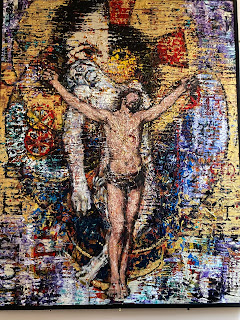A Christian View of Freedom (Fourth of July 2021)
Read: Galatians 5:13-15
We are getting ready to celebrate the Fourth of July holiday this coming weekend. There is something about Fourth of July that has a nostalgic feel for me. I think back to sitting on the trunk of a car as a child to watch fireworks, eating corn on the cob, baked beans and watermelon, swimming with cousins and friends. It brings back images of waving flags, sparklers, and red-white-and blue colored banners hanging from street lampposts. What memories come to mind for you?
The Fourth of July, though, is about more than nostalgia or even patriotic fervor. It is the day we celebrate the sacred concept of freedom (life, liberty, and the pursuit of happiness), for which people have bravely fought and died. We have written books, poems and songs dedicated to freedom. It is a time-honored ideal that gives America its identity.
Still, it is an imperfectly embodied ideal, kept from far too many in our past. Our American story, even with our emphasis on freedom, also reveals an economy built on slavery and racism, Jim Crow laws, a denial of voting rights for women, cruelty towards native persons, LGBTQ oppression, and even the internment of persons of Asian descent during World War II. We are still journeying towards a more perfect union, realizing the truth that ALL people are created equal, and freedom is for ALL.
So, I find myself pondering this Fourth of July weekend the concept of freedom that we celebrate and build our national identity upon. Further, I am asking what it means for those of us seeking to follow the ways of Christ.
For some, freedom is, simply put, the inherent right to say and do what one wants without impediment. It is mostly about self-interest and what one has the right to do, often with little regard for the impact on others. There are, of course, legal limits. One’s freedoms cannot infringe too much on another person’s freedoms. However, it is not always clear when such is the case. Many Supreme Court cases are spent in deliberation of this dilemma. In the end, the problem with regarding freedom as primarily one’s personal rights is that it makes us very self-focused.
There is a balance when it comes to freedom. While it is important to recognize and claim basic freedoms for self, we also must be concerned enough to ensure others, particularly oppressed and minority groups, also experience freedom. We can’t simply be motivated by self-interest.
This is especially true for those who follow the way of Jesus. Nearly 2,000 years ago, the Apostle Paul wrote, “You were called to freedom brothers and sisters; only don’t let this freedom be an opportunity to indulge your selfish impulses but serve each other through love.” (Galatians 5:13, CEB) For Paul, freedom lived well is not just doing or saying what we want, but looking out for others, creating space for others to thrive. Freedom for Paul, and for those following the way of Christ still today, is not about selfish indulgence or self-focus. It is about being a blessing for others in the name of love.
This can be a difficult word for some. This approach to freedom means that the privileged will sometimes have to surrender some of their privileges to ensure that both they and others can pursue life, liberty, and happiness. It means that we are as concerned with the freedoms of others as we are with freedoms for self. For the Christian, freedom brings both the opportunity and the responsibility to serve and stand for others, not simply to amass personal rights and privileges at the expense of others.
So, as we head into this Fourth of July weekend, I find it helpful to spend time reflecting on freedom, this beautiful, even if imperfect, ideal expressed in the Declaration of Independence. How can you be both grateful for the freedoms that you experience and empathetic towards others still crying out for freedom? How can you use your freedoms to serve out of love, rather than pursue selfish indulgence? These are the questions that we, the followers of Jesus, must ponder as we head into the Fourth of July weekend.



Comments
Post a Comment